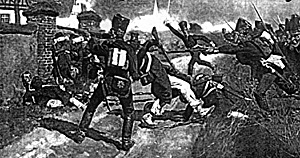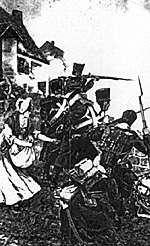Lützen 1813:
Prussia Re-enters the Fray
Introduction
by Patrick E. Wilson, UK
| |
Frederick William was a timid man who lived in fear of Napoleon, despite the disastrous outcome of the Russian Campaign, and it seems that he may have been swept along by events, responding rather then creating them. Luckily for Prussia, then, that she had men of greater strength. The coming months would see the rise of men like Blucher, Gneisenau, Scharnhorst and Bülow. It was to be men like these who would lead a revitalised Prussian Army to eventual victory and recover the tarnished glory of former days. Needless-to-say, it was General Yorck who began the work to reorganise the Prussian Army in East Prussia by taking that Province into an alliance with Russia before any treaty was signed. Here Prussia was helped by the French who had ordered Frederick William to raise new troops to replace those lost in Russia, this new corps was formed in Silesia and placed under the command of General von Blucher. After the signing of the Treaty of Kalish more troops were ordered to be raised in Pommerania and West Prussia, where Generals von Bülow and von Borstell brought their regiments up to full strength and raised reserve battalions. The main Prussian Army however was in Silesia, near Breslau and the King, and under the command of von Blucher. It was organised into three brigades (a Prussian brigade was equivalent to a French division) and a cavalry reserve. These troops were some of the finest that Prussia could offer and had not taken part in the invasion of Russia. They were also mainly veteran, professional and very eager to enter the conflict against France. Many of the officers had taken part in the 1806-07 campaigns and consequently longed for revenge. The Prussian brigades were organised as self-sufficient entities, each having elements of the three arms, cavalry, infantry and artillery. This made them difficult to fight against and give the Prussian Generals a real advantage over their opponents. Their tactics were a mixture of column and line, and took into account the experiences of 1806-07, with the emphasis on skirmishers and the shock attack though the close support of both cavalry and artillery took the tactics a step further, greatly to the dismay of the French! However even though the Prussian Army had a new look, manoeuvred and fought differently then in 1806-07, and was now about to embark on a crusade to rid Prussia of the French. There was a distinct lack of enthusiasm within the populace of Prussia as a whole, volunteers were limited and the recalling of the reserves would not supply all the men Prussia needed. Frederick William was therefore reluctantly forced to introduce conscription to form the Landwehr regiments envisaged and though these regiments were recruited as ordered many of the personnel simply disappeared at the earliest opportunity. Therefore one can only conclude that the "myth" of a people's war is rather misleading and the real enthusiasm for the war came from the Army and the senior officers and ministers of Prussia. That said, those that were in the Armies of Prussia, as the Historian F.L. Petre has commented: "though Russia supplied the greater number of troops, the quality, the spirit of patriotism and enthusiasm that pervaded Prussia's troops meant that Prussian forces were of a distinctly greater value." 1
Prussian troops capture Luneberg on 2 April 1813. After Ernst Zimmer.
Here von Blucher was joined by the Russian advance guard under General Winzingerode but the main body of that Army was held back by their Commander-in-chief, Field Marshal Prince Kutusov, who felt that Russia had played its part in driving Napoleon from the sacred soil of Holy Russia and if others wished to do the same for their own lands then they should do so with the means at their disposal, and not ask Russia to make further sacrifices. However, Kutusov was an ill man and the Tsar Alexander I increasingly saw himself as the leader of a crusade to free Europe from French dominance, though while Kutusov lived, because of his services to Russia, he acquiesced to the Field Marshal's wishes.
Meanwhile in East Prussia, General Wittgenstein and General Yorck had joined forces and advanced into Pommerania, collecting other Prussian forces on the way they then advanced on and occupied Berlin without any resistance as the French fell back. An attempt to capture Magdeburg in early April though was thwarted by Prince Eugene de Beauharnais and his French army in a series of engagements called the Battle of Mockern. Wittgenstein himself claimed that this battle was a victory in that it demonstrated the fighting ability of the Prussians and Prince Eugene did withdraw behind the Elbe as a result.
There now followed a period of repose as both sides bought up reinforcements and organised, the Allies deciding to shift southward with the majority of Wittgenstein's forces crossing the Elbe at Rosslau and moving to join Blucher's forces which advanced from Dresden to Altenburg.
On the 28th April Kutusov died at Bunzlau and freed the hands of Alexander, though some Russian formations were still well to the east of Blucher's and Wittgenstein's concentration. A further complication occurred when Alexander appointed Wittgenstein the new Commander-in-chief, Blucher was agreeable but some Russian generals, Miloradowich and Tormassow asserted their seniority and refused to take orders from Wittgenstein, who was their junior not only in years but in length of service too. Consequently the troops of these two generals took their orders direct from the Tsar and took their time about marching westward to Wittgenstein's assistance. They would also play little if any part in the coming battle.
Wittgenstein's plan was to assemble all the forces at his disposal in the Leipzig area so that he was in a position to attack Napoleon as he marched up to join Prince Eugene de Beauharnais. It was hoped that this offensive would take Napoleon by surprise and catch his army strung out on its line of march, enabling the Allies to push a substantial part into the Saale/Elster rivers.
As Wittgenstein's forces began to assemble as ordered combats with enemy units developed, primarily it was the result of Prince Eugene de Beauharnais moving south to meet Napoleon's expected advance, initially these combats resulted in the repulse of the enemy but by the 29th April both Halle and Merseburg were lost to Eugene de Beauharnais. On the same day, Winzingerode with Blucher's advance guard engaged the leading division of Napoleon's at Weissenfels. A major battle was clearly evident and it was decided by the Allies to attack in the Lützen area as soon as all the forces available were assembled and ready but in the meantime the outpost combats would continue. On 1st May as the Allies marched to their final assembly points prior to the attack, a combat took place at Rippach that resulted in the death of the French general Marechal Jean-Baptiste Bessieres and his orderly, Sergeant Jordan, but did not halt the French advance. That night the French Corps d'Armée of Marechal Michel Ney bivouacked in the vicinity of Lützen, though he and his divisional generals did not post adequate lookouts, for had they done so they would have learned that the main Allied army was no more then five miles away and encamped between the Elster and Peisse rivers. This failure was to give Wittgenstein the advantage he desired most -- surprise!
More Battle of Lutzen: 1813
|
 General Yorck's famous convention of Taurroggen in December 1812 left King Frederick William III in a bit of a dilemma. Still nominally an ally of Napoleon, Yorck's action was theoretically treasonable and Frederick William had at first disowned it but under pressure from his Army and Ministers he would eventually sign the Treaty of Kalish, a military alliance with Russia. Though Frederick William took the precaution of moving his headquarters and staff out of Berlin to Breslau in Silesia before he finally declared war against France in March 1813.
General Yorck's famous convention of Taurroggen in December 1812 left King Frederick William III in a bit of a dilemma. Still nominally an ally of Napoleon, Yorck's action was theoretically treasonable and Frederick William had at first disowned it but under pressure from his Army and Ministers he would eventually sign the Treaty of Kalish, a military alliance with Russia. Though Frederick William took the precaution of moving his headquarters and staff out of Berlin to Breslau in Silesia before he finally declared war against France in March 1813.
 At the end of March 1813 General von Blucher led the main Prussian Army out of Silesia into Saxony, he easily took Dresden on 27th when the French commander there, General Comte Reynier, retired westward.
At the end of March 1813 General von Blucher led the main Prussian Army out of Silesia into Saxony, he easily took Dresden on 27th when the French commander there, General Comte Reynier, retired westward.